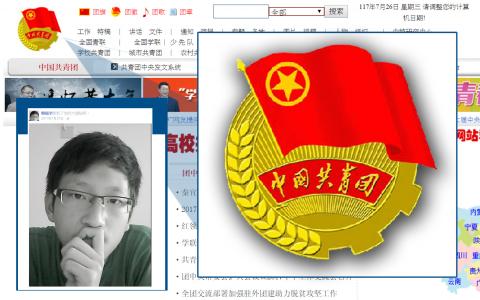Netizens yesterday challenged the Chinese-language China Times’ claim that its intern, Han Fu-yu (韓福宇), is not a member of the Communist Youth League of China (CYL).
The league, tasked with the mission to promote communism, has long been regarded as a training ground for promising political talent. Notable members include Chinese Premier Li Keqiang (李克強) and Chinese Communist Party (CCP) Central Committee member Hu Chunhua (胡春華).
The China Times on Tuesday issued a statement defending Han, after the Legislative Yuan pressed charges against the intern for throwing water balloons at Democratic Progressive Party (DPP) lawmakers during a joint committee review of the budget for the Forward-looking Infrastructure Development Program on Wednesday last week.

Photo: Screen grab from the Internet
Han, a Taiwanese student and recipient of a scholarship from Beijing’s Communication University of China, could not possibly be a CCP spy, as he is not a member of the Communist Youth League, the China Times statement said.
However, Taiwanese online news Web site Newtalk yesterday reported that Taiwanese netizens have found Han’s name and photograph on the school’s Web site — in a section where student members of the league are shown — and shared the discovery on Facebook. ‘
Han is listed as a “director” of the league’s student committee, with an insignia of the league shown on the top of the page, the report said.
The disclosure went viral and drew an influx of online comments, with many netizens criticizing Han’s apparent affiliation with the league.
“He took selfies throwing balloons at DPP lawmakers, so he can go back to China to claim his reward,” a netizen said.
“Being a member of the league, [he] won’t have problem joining the CCP. A bright future awaits,” another said.
Chinese Nationalist Party (KMT) caucus secretary-general Lin Wei-chou (林為洲) yesterday expressed amazement at the turn of events, saying it was something he “could not have imagined.”
“If true, the China Times should explain whether it knew of Han’s identity before bringing him into the legislature,” Lin said.
DPP Legislator Huang Wei-cher (黃偉哲) said that one does not need to be a member of the league to be a spy for China, adding that league members are usually given political assignments.
He urged prosecutors to promptly ascertain Han’s identity.
Han has previously denied being a league member, saying that he had only been a member of the China Young Volunteers.
According to the China Young Volunteers Web site, it is a spinoff of the CYL.
China Young Volunteers’ articles of association said it is under the CYL’s direct supervision.

CHAOS: Iranians took to the streets playing celebratory music after reports of Khamenei’s death on Saturday, while mourners also gathered in Tehran yesterday Iranian Supreme Leader Ayatollah Ali Khamenei was killed in a major attack on Iran launched by Israel and the US, throwing the future of the Islamic republic into doubt and raising the risk of regional instability. Iranian state television and the state-run IRNA news agency announced the 86-year-old’s death early yesterday. US President Donald Trump said it gave Iranians their “greatest chance” to “take back” their country. The announcements came after a joint US and Israeli aerial bombardment that targeted Iranian military and governmental sites. Trump said the “heavy and pinpoint bombing” would continue through the week or as long

TRUST: The KMT said it respected the US’ timing and considerations, and hoped it would continue to honor its commitments to helping Taiwan bolster its defenses and deterrence US President Donald Trump is delaying a multibillion-dollar arms sale to Taiwan to ensure his visit to Beijing is successful, a New York Times report said. The weapons sales package has stalled in the US Department of State, the report said, citing US officials it did not identify. The White House has told agencies not to push forward ahead of Trump’s meeting with Chinese President Xi Jinping (習近平), it said. The two last month held a phone call to discuss trade and geopolitical flashpoints ahead of the summit. Xi raised the Taiwan issue and urged the US to handle arms sales to

State-run CPC Corp, Taiwan (CPC, 台灣中油) yesterday said that it had confirmed on Saturday night with its liquefied natural gas (LNG) and crude oil suppliers that shipments are proceeding as scheduled and that domestic supplies remain unaffected. The CPC yesterday announced the gasoline and diesel prices will rise by NT$0.2 and NT$0.4 per liter, respectively, starting Monday, citing Middle East tensions and blizzards in the eastern United States. CPC also iterated it has been reducing the proportion of crude oil imports from the Middle East and diversifying its supply sources in the past few years in response to geopolitical risks, expanding

Pro-democracy media tycoon Jimmy Lai’s (黎智英) fraud conviction and prison sentence were yesterday overturned by a Hong Kong court, in a surprise legal decision that comes soon after Lai was jailed for 20 years on a separate national security charge. Judges Jeremy Poon (潘兆初), Anthea Pang (彭寶琴) and Derek Pang (彭偉昌) said in the judgement that they allowed the appeal from Lai, and another defendant in the case, to proceed, as a lower court judge had “erred.” “The Court of Appeal gave them leave to appeal against their conviction, allowed their appeals, quashed the convictions and set aside the sentences,” the judges